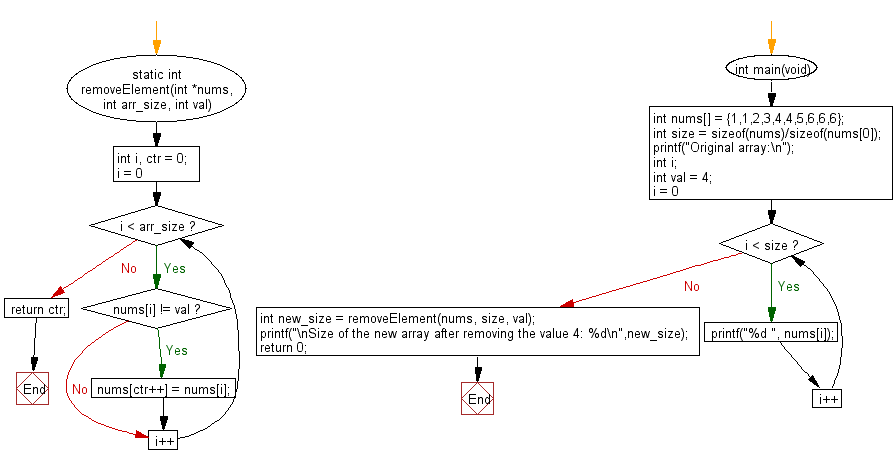C Exercises: Remove all instances of a given value in a given array of integers and return the length of the new array
C Programming Practice: Exercise-13 with Solution
Write a C programming to remove all instances of a given value in a given array of integers and return the length of the new array.
C Code:
#include <stdio.h>
#include <stdlib.h>
static int removeElement(int *nums, int arr_size, int val)
{
int i, ctr = 0;
for (i = 0; i < arr_size; i++) {
if (nums[i] != val) {
nums[ctr++] = nums[i];
}
}
return ctr;
}
int main(void)
{
int nums[] = {1,1,2,3,4,4,5,6,6,6};
int size = sizeof(nums)/sizeof(nums[0]);
printf("Original array:\n");
int i;
int val = 4;
for (i = 0; i < size; i++) {
printf("%d ", nums[i]);
}
int new_size = removeElement(nums, size, val);
printf("\nSize of the new array after removing the value 4: %d\n",new_size);
return 0;
}
Sample Output:
Original array: 1 1 2 3 4 4 5 6 6 6 Size of the new array after removing the value 4: 8
Pictorial Presentation:
Flowchart:

C Programming Code Editor:
Contribute your code and comments through Disqus.
Previous: Write a C programming to remove the duplicates from a given array of integers.
Next: Write a C programming to find the index of the first occurrence of a given string within another given string. If not found return -1.
What is the difficulty level of this exercise?
Test your Programming skills with w3resource's quiz.
C Programming: Tips of the Day
Static variable inside of a function in C
The scope of variable is where the variable name can be seen. Here, x is visible only inside function foo().
The lifetime of a variable is the period over which it exists. If x were defined without the keyword static, the lifetime would be from the entry into foo() to the return from foo(); so it would be re-initialized to 5 on every call.
The keyword static acts to extend the lifetime of a variable to the lifetime of the programme; e.g. initialization occurs once and once only and then the variable retains its value - whatever it has come to be - over all future calls to foo().
Ref : https://bit.ly/3fOq7XP
- New Content published on w3resource:
- HTML-CSS Practical: Exercises, Practice, Solution
- Java Regular Expression: Exercises, Practice, Solution
- Scala Programming Exercises, Practice, Solution
- Python Itertools exercises
- Python Numpy exercises
- Python GeoPy Package exercises
- Python Pandas exercises
- Python nltk exercises
- Python BeautifulSoup exercises
- Form Template
- Composer - PHP Package Manager
- PHPUnit - PHP Testing
- Laravel - PHP Framework
- Angular - JavaScript Framework
- Vue - JavaScript Framework
- Jest - JavaScript Testing Framework
